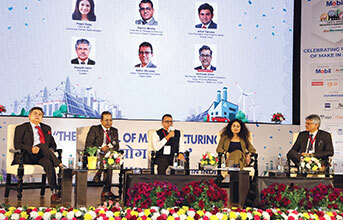
With Industry 4.0 and now 5.0 taking centre stage, the need to adopt energy efficiency solutions to create a stronger impact on the global economy has become more crucial than ever. At a recent panel discussion on "Revolutionising the Renewable Power Landscape: A Decade of Make in India" held at the Festival of Manufacturing, industry leaders deliberated on the renewable journey through the lens of Make in India.
Moderated by Abhijeet Sinha, Technocrat, National Program Director for Ease of Doing Business, and Project Director - NHEV, Ex-CAG, the panellists, comprising Preeti Bajaj, CEO & MD, Luminous Power Technologies; Amar Variawa, Vice President and Country Head, Vestas India; Rakesh Sarin, President – Corporate Development, Suzlon Energy; and Rahul Bhutiani, Head- Marketing and Sales, Adani Solar, discussed the need for innovation and efficiency in the renewable power sector. Additionally, the importance of tapping into the market to make renewable energy accessible in rural India was a major theme throughout.
Preeti Bajaj, CEO & MD of Luminous Power Technologies, emphasised the need to make energy solutions creative and competitive to stand out in the global market. She talked about how small and medium enterprises can adopt ways to use energy efficiently. Her illustrative examples throughout the session were noteworthy: generating your own power, storing it, reusing it, and being more independent. Hence, having distributed power everywhere is a boon for a developing country like India.
Rakesh Sarin, President – Corporate Development, Suzlon Energy, talked about incentivising MSMEs and manufacturers and tapping into the great opportunity. This can be made possible by exploring the hidden potential of innovation and R&D, which can lead to setting up more manufacturing units and making deployment available. As a result, this can be dispensed to people, and they can adopt thinner and leaner ways of becoming more energy efficient. Sarin also elucidated on how the government is working to increase energy capacity to meet the increasing demands of the people. Furthermore, he highlighted areas that need improvement, which include reducing the costs for the adoption of renewable energy in India.
Amar Variawa, Vice President and Country Head of Vestas India talked about bridging the gap between the high cost of renewable energy and rising demands by manufacturing more at a larger scale. Bringing innovative solutions for solar energy is key to making it more affordable and sustainable for both urban and rural populations.
Rahul Bhutiani, Head of Marketing and Sales at Adani Solar discussed the important concept of obtaining subsidies for handholding smaller units while putting up a solar panel. He also talked about how the demand for going green is increasing in exports and that the adoption of sustainable practices completely is yet to happen. Furthermore, he laid emphasis on the need to reduce dependency on other countries for exporting solar panels. He also applauded government initiatives for bringing the supply chain to India and making it a success. Additionally, the Surya Ghar Yojana intends to power 1 crore houses in India with a 60 per cent subsidy, proving that India is heading in the direction of making renewable energy an integral part of its energy ecosystem.
Apart from that, Bhutiani also highlighted the need to distribute solar panels. He also elucidated on how farmers need to be empowered to use solar pumps to sustain their crops.
In a nutshell, the panel discussed ways to make renewable energy more affordable in India. The key takeaways of the discussion focused on the need for initial investment to be worked upon, especially for solar energy. The real challenge is to help renewable energy, especially solar, become a part of every household. The panel also talked about the importance of adopting innovative solutions to make renewable energy accessible to every part of India.
